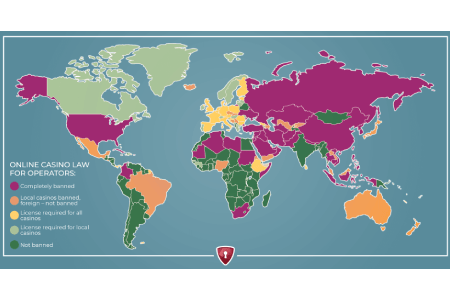News and Articles

In 2021, online gambling will be allowed in which jurisdictions?
Before opening an online project, every operator primarily asks the question: what market to choose? Where can I operate freely, and where do I need to go through the licensing procedure?
Slotegrator examined this question. Our experts prepared a list of countries where online gambling operation is legal.
To make it even more convenient, we sorted them by continents. It includes not only those countries subject to certain requirements and where online gambling is regulated by law. There are also those countries where online gambling is neither regulated nor prohibited.
Depending on different approaches to gambling regulation in the world, all countries are divided into 4 groups.
Countries where foreign online casinos are not blocked:
| Africa | Asia | Europe | North America | South America | Oceania |
| Eritrea Nigeria |
Azerbaijan Brunei Hong Kong Japan Kyrgyz Republic Laos Malaysia Qatar Singapore Uzbekistan Yemen |
Cyprus Bosnia and Herzegovina Czech Republic Iceland Luxembourg Serbia Slovakia |
Cayman Islands Salvador Mexico |
Brazil | American Samoa Australia Guam New Zealand |
The local regulators do not apply any legislative requirements in these countries. Foreign gambling sites can be licensed in any jurisdiction or generally operate without it.
However, it should be noted that gambling is not necessarily legal in these countries.
For example, the Cayman Islands completely prohibit gambling, while the local residents are liable for participation in gambling. The fact that foreign online casinos are not blocked now can only be explained by the inability of regulator to do this. And if the online gambling is not legalized, blocking of foreign sites is just a matter of time.
Online gambling laws around the world
Today almost every country has its own rules regulating the land-based gambling. However, the situation with online gambling is more ambiguous. As can be seen, the attitude towards local and foreign operators differs fundamentally from country to country.
In the European Union, for example, the operators of the foreign gambling sites are subject to the requirements of the EU law. However, not all countries agree that foreign operators don’t pay taxes to the local treasury. Contrary to the requirements of the EU, they put the foreign operators under own regulations forcing them to obtain a local gaming license and pay taxes to the local budget. Among these countries France, Germany, Italy, etc.
The second reason for the different attitudes to local and foreign operators is that many countries (especially those not technologically advanced) simply do not have the resources or tools to prevent foreign companies from operating in their territories.
Summing up the availability of online gambling around the world:
- 32 countries prohibit the local operators from working without a license, but those gambling sites that operate from abroad can easily offer their services to local residents. Among them, the following countries: Seychelles, Armenia, Dominican Republic, Greece, Monaco, Norway, Canada, Sweden, Switzerland, etc.
- 32 countries allow online gambling only with the local license. For example, Austria, Denmark, Finland, France, the UK, the Netherlands etc.
- 28 countries prohibit locals from gambling and block sites of local gambling operators. However, foreign platforms can work freely, even if they have no license. These states are either unwilling or are not able to prevent them. For example, Australia, Brazil, New Zealand, Mexico, Japan, Singapore, Nigeria, etc.
- 93 countries do not prohibit online casinos and do not license them. They include Bolivia, Uruguay, Venezuela, Bahamas, Argentina, Egypt, Kenya, Tunisia, Kosovo, Gibraltar, etc.
 United Kingdom
United Kingdom
 Germany
Germany
 Finland
Finland
 Norway
Norway
 Canada
Canada
 Ireland
Ireland
 New Zealand
New Zealand
